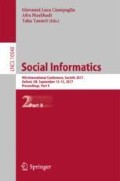Abstract
In a study of about 33,000 individuals in a south Asian country, we find that structural diversity, measured as the fraction of open triads in an ego-network, shows a relatively strong association with individual income. After including all the relevant control variables, the effect of structural diversity becomes exclusive to the highly educated individuals. We hypothesize these results are due to concentrated distribution of economic opportunities among the highly educated social strata combined with homophily among members of the same group. This process leads to two important societal consequences: extra network advantages for the highly educated, similar to the rich club effect, and inadequate diffusion of economic opportunities to the low educated social strata.
The original version of this chapter was revised: An acknowledgement has been added. The erratum to this chapter is available at https://doi.org/10.1007/978-3-319-67256-4_44
References
Åberg, Y., Hedström, P.: Youth unemployment : a self-reinforcing process?. In: Demeulenaere, P. (ed.) Analytical Sociology and Social Mechanisms, p. 201. Cambridge University Press, New York (2011)
Blau, P.M., Duncan, O.D.: The American Occupational Structure, vol. 33 (1968)
Burt, R.S.: Structural holes and good ideas. Am. J. Sociol. 110(2), 349–399 (2004)
Christakis, N., Fowler, J.: The collective dynamics of smoking in a large social network. N. Engl. J. Med. 21358(22), 2249–2258 (2007)
Eagle, N., Macy, M., Claxton, R.: Network diversity and economic development. Science 335, 1215–1220 (2012)
Elliott, J.R.: Social isolation and labor market insulation: network and neighborhood effects on less-educated urban workers. Sociol. Q. 40(2), 199–216 (1999)
Epple, D., Romano, R.E.: Peer effects in education: a survey of the theory and evidence. Handb. Soc. Econ. 1(1B), 1053–1163 (2011)
Granovetter, M.: The strength of weak ties. J. Sociol. 78(6), 1360–1380 (1973)
Granovetter, M.: Economic action and social structure: the problem of embeddedness. Am. J. Sociol. 91(3), 481–510 (1985)
Granovetter, M.S.: Getting a Job: A Study of Contacts and Careers, vol. 25. University of Chicago Press, Chicago (1996)
Ioannides, Y.M., Datcher, L.: Job information networks, neighborhood effects, and inequality. J. Econ. Lit. 42(4), 1056–1093 (2004)
Kish, L.: A procedure for objective respondent selection within the household. J. Am. Stat. Assoc. 44(247), 380 (1949)
Lin, N., Ensel, W.M., Vaughn, J.C.: Social resources and strength of ties : structural factors in occupational status attainment. Am. Sociol. Rev. 46(4), 393–405 (1981)
Lin, N., Ensel, W.M., Vaughn, J.C.: Social resources and occupational status attainment. Am. Sociol. Rev. 59(46), 393–405 (1981)
Luo, S., Morone, F., Sarraute, C., Travizano, M., Makse, H.A.: Inferring personal economic status from social network location. Nat. Commun. 8 (2017). 15227
Marmaros, D., Sacerdote, B.: Peer and social networks in job search. Eur. Econ. Rev. 46(4–5), 870–879 (2002)
McDonald, S., Lin, N., Ao, D.: Networks of opportunity: gender, race, and job leads. Soc. Probl. 56(3), 385–402 (2009)
Reagans, R., Mcevily, B.: Source network structure and knowledge transfer: the effects of cohesion and range. Adm. Sci. Q. 48(2), 240–267 (2012)
Reagans, R., Zuckerman, E.W.: Networks, diversity, and productivity: the social capital of corporate R&D teams. Organ. Sci. 12(4), 502–517 (2001)
Wu, L., Waber, B., Brynjolfsson, E., Pentland, A.S.: Mining face-to-face interaction networks using socimetric badges: predicting productivity in an ITC configuation task. In: ICIS. pp. 1–19 (2008)
Acknowledgement
This material is based upon work supported by the National Science Foundation Graduate Research Fellowship under Grant No. 1122374. Any opinion, findings, and conclusions or recommendations expressed in this material are those of the authors(s) and do not necessarily reflect the views of the National Science Foundation.
Author information
Authors and Affiliations
Corresponding author
Editor information
Editors and Affiliations
Rights and permissions
Copyright information
© 2017 Springer International Publishing AG
About this paper
Cite this paper
Jahani, E., Saint-Jacques, G., Sundsøy, P., Bjelland, J., Moro, E., Pentland, A.‘. (2017). Differential Network Effects on Economic Outcomes: A Structural Perspective. In: Ciampaglia, G., Mashhadi, A., Yasseri, T. (eds) Social Informatics. SocInfo 2017. Lecture Notes in Computer Science(), vol 10540. Springer, Cham. https://doi.org/10.1007/978-3-319-67256-4_5
Download citation
DOI: https://doi.org/10.1007/978-3-319-67256-4_5
Published:
Publisher Name: Springer, Cham
Print ISBN: 978-3-319-67255-7
Online ISBN: 978-3-319-67256-4
eBook Packages: Computer ScienceComputer Science (R0)

